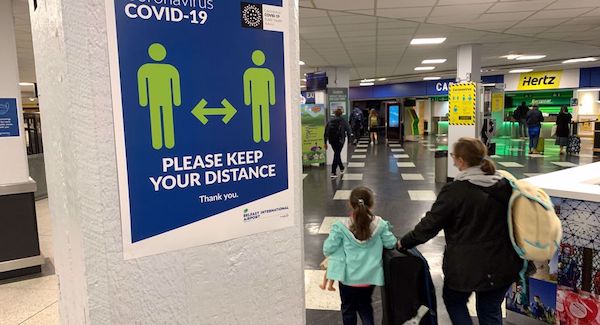
Passengers arrive at an airport in the United Kingdom on June 15, 2020 as Easyjet resumes flights for the first time since the March coronavirus lockdown. (AFP photo)
Ministers have been seen as responsible for the sense of "panic and loss of control" as a consequence of the sudden decision to do away with an air bridge agreement with Spain and resulting in the reimposition of stringent quarantine measures.
On Saturday evening, with very little warning, the UK government removed Spain from its safe flight list, which means hundreds of thousands of British holidaymakers, currently in Spain, are now bound by law to spend 14 days in self-isolation upon return to the UK.
The travel and tourism industry, about to lose millions in revenue, reacted with fury at the unexpected move and questioned the rationale behind the decision to impose the strict quarantine measures on all regions of Spain, including the Balearics and the Canary Islands.
The foreign secretary, Dominic Raab, stressed that the government would make "no apologies" for the decision to reimpose the mandatory quarantine for those entering the UK from Spain.
"We canít make apologies for doing so," he added. "We must be able to take swift, decisive action, particularly in relation to localised, or internationally in relation to Spain or a particular country, where we see we must take action. Otherwise, we risk re-infection into the UK, potentially a second wave here and then another lockdown."
Nick Thomas-Symonds, the shadow home secretary, also called on the government to accelerate the Covid-19 track, trace and isolate system "so as to avoid the need for the blunt tool of 14-day quarantine".
"The governmentís policy regarding travel restrictions has lacked grip and coherence from the outset," he added. "The latest decision-making process regarding Spain and the short notice for travellers has created a sense of panic and loss of control.
"The government should have proper contingency plans to support people coming home where there is no guarantee their employers will allow them 14 days of work flexibility."
Spainís foreign minister Arancha Gonzalez told reporters on Sunday her government had entered into "dialogue" with the UK to exclude the Balearic and the Canary Islands from the strict quarantine measures and hoped talks "will bear fruit shortly".
Ms Gonzalez argued: "Like any other European country we are seeing outbreaks - the outbreaks in Spain are perfectly controlled. Spain is a safe country for tourists and Spaniards."
Dr Daniel Lopez-Acuna, a Spanish epidemiologist, questioned the UK governmentís sudden decision to reimpose the strict quarantine measures. "In my perspective itís unjustified epidemiologically," he told the BBCís The World This Weekend. "Itís being unfair, itís being unnecessary. I donít think itís been the most appropriate thing."
He said: "Actually 14 regions in Spain have an infection rate that is lower than the average infection rate in the UK. The problem - the spike, the increased number of cases - itís concentrated exclusively in three regions: Catalonia, Aragon and Navarre where there have been outbreaks that have gone into community transmission which have required some more of the drastic measures of confinement or limited mobility, or mitigation strategy for reducing community transmission."
This sudden reversal of the air bridge agreement with Spain has even caught out transport secretary Grant Shapps and Paul Scully, the minister for London, who were already in Spain, enjoying a summer break from parliament, which is currently in recess for six weeks. They will be forced to self-isolate for 14 days when they return to the UK.
On Sunday, Mr Shapps posted on social media: "Following the unexpectedly rapid rise in Spainís coronavirus cases, I held a video call with UK airlines + our ambassador Hugh Elliott today in order to ensure close coordination to help UK nationals return from Spain. We will need to quarantine for 14 days on arrival."
SOURCE: PRESS TV
LINK: https://www.ansarpress.com/english/19740
TAGS:






























 Farkhunda Buried, Ghani Appoints Fact-Finding Team
Farkhunda Buried, Ghani Appoints Fact-Finding Team




